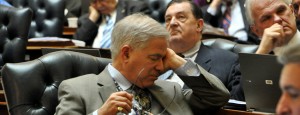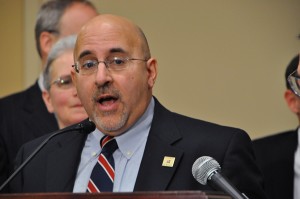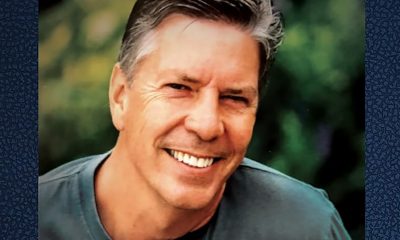Local
‘Strategic blunder of monstrous proportions’
Insiders rip HRC, Gill decision to cancel Maryland vote on marriage
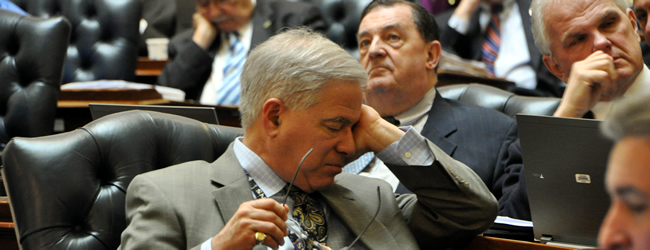
The decision to cancel a March 11 vote on a same-sex marriage bill in the Maryland House of Delegates was a mistake that could hurt rather than help the chances for passing the bill within the next several years, according to Maryland-based advocates who lobbied for the bill.
The advocates who expressed this view, some of whom spoke on condition that they not be identified, said at least four national LGBT groups put pressure on lawmakers through Equality Maryland, the statewide LGBT group, to withdraw the bill rather than risk a losing vote.
One of the advocates called the national groups and their political operatives who came to Maryland to lobby for the bill well intentioned but unfamiliar with the nuances and “rhythms” of the Maryland Legislature.
“I think this was a strategic blunder of monstrous proportions,” said Mark McLaurin, political director of Maryland’s Local 500 of the Service Employees International Union (SEIU), which lobbied for the bill.
McLaurin, a gay man who has lobbied the Maryland Legislature for progressive causes for more than 15 years, said many insiders familiar with the legislature don’t think a losing vote by a close margin would hurt the bill’s chances in the future.
On the other hand, McLaurin and others who favored taking a vote on the marriage bill said the legislature has a history of not taking up highly controversial bills two years in a row. McLaurin said he fears that the bill won’t come back for a vote until 2015, even though Speaker of the House Michael Busch (D-Anne Arundel County) said he would try to bring the measure back in 2012.
Busch said supporters appeared to fall just a few votes shy of the 71 votes needed to pass the bill in the 141-member House. However, he said wavering delegates might have chosen to vote “yes,” raising the possibility that the bill could have passed.
Several knowledgeable sources, who spoke on condition of anonymity, agreed with McLaurin’s assessment.
“Gill and HRC decided it was detrimental to the larger movement to have the vote go down,” one source said. “Gays and lesbians in Maryland deserved a debate and a vote on legislation that we waited years for.”
Another source criticized Busch’s handling of the bill.
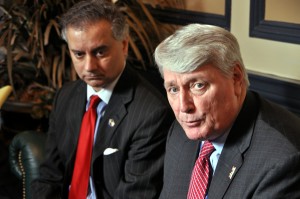
Maryland House of Delegates Majority Leader Kumar Barve and Maryland House Speaker Michael Busch (Washington Blade photo by Michael Key)
“[Speaker Michael] Busch could have squeezed harder but didn’t. This is a new House of Delegates and this man didn’t bother to take the temperature of the new House of Delegates. I was shocked. I thought House leadership was more strategic, intelligent and powerful than this and it all evaporated.
“God forbid we put our swing vote Democrats on the line to take a vote for our families. Or maybe the Speaker has lost control of his chamber.”
There was also criticism of Gov. Martin O’Malley, who the sources faulted for not taking a more public stand in support of the bill.
“O’Malley stopped by Friday for a photo op with marriage supporters,” one source said. “What a vacant gesture at the 11th hour. You couldn’t write an op-ed the week before?”
The Civil Marriage Protection Act won approval in the Maryland Senate earlier this month. It died last Friday for at least this year when the House of Delegates approved by voice vote a motion to send it back to committee.
All of the bill’s sponsors, including seven openly gay members of the House of Delegates, appeared to support the motion, a development that stunned LGBT activists watching the proceedings from the visitors’ gallery.
The motion to recommit the bill to committee came after supporters and opponents engaged in an emotional, two-and-a-half hour debate over the bill. Most of the activists for and against the bill watching from the galleries didn’t know that the bill’s sponsors had decided beforehand to cancel the vote.
McLaurin said he learned from those attending strategy meetings that the eight-member LGBT Caucus of the legislature was divided over whether to postpone the House vote.
The caucus includes Sen. Richard Madaleno (D-Montgomery County), and House of Delegates members Maggie McIntosh, Mary Washington, and Luke Clippinger, each Democrats from Baltimore; Heather Mizeur, Bonnie Cullison, and Anne Kaiser, each Democrats from Montgomery County; and Peter Murphy, a Democrat from Charles County.
Spokespersons for Equality Maryland, the statewide LGBT group that led the lobbying effort for the bill, and officials with the national groups Freedom to Marry and Human Rights Campaign defended the decision to withdraw the bill.
They said the decision was made jointly by the bill’s lead sponsors, including the one gay male and six lesbian delegates, who determined it was better to postpone the vote than to risk a losing vote, which they said would be perceived as a defeat.
“This is a strategic effort to give ourselves more time to make the case and win,” said Evan Wolfson, executive director of Freedom to Marry. “And all of us believe we can win. It’s just a matter of nailing down the votes and getting there.”
HRC spokesperson Fred Sainz said the decision to cancel the vote came after it became clear that supporters didn’t have the votes to pass it.
“This was a shared decision by all the stakeholders – Equality Maryland, the state’s LGBT Caucus, Gill Action, Freedom to Marry, and HRC,” he said. “It was the consensus belief that the best way to win marriage in Maryland was by a delay and not by losing a vote.”
Officials with Gill Action, a philanthropic group founded by gay businessman Tim Gill in Colorado that funds LGBT rights causes, did not return a call seeking comment.
An official with the Gay & Lesbian Victory Fund, Robin Brand, also pushed for postponing the vote, activists familiar with the legislature said. Brand told the Blade she discussed the issue with the gay delegates in the Victory Fund’s role of working with openly gay elected officials. She said she left it up to them to decide on whether or not a vote should be taken.
McLaurin, a former member of the Equality Maryland board, said the advocates who wanted the vote to go forward believe it would have been worth “a roll of the dice” to determine if supporters had the 71 votes needed to pass the bill.
“In the worst case scenario we would have come up two or three votes short,” he said. “And I think that a loss by two or three votes would be much more galvanizing to the community of supporters that we’re going to need to rally and accomplish this goal.”
McLaurin added, “Either way it was going to get billed as a failure. I’d rather have on record who’s with us and who’s against us.”
Another former Equality Maryland board member, David Toth, wrote in a Facebook posting that the group was deleting messages left on its own Facebook page that were posted by a large number of supporters who expressed outrage over the decision not to have a vote on the bill.
“Anyone who is asking questions of EqMD or its staff is having their posts deleted like crazy,” he wrote. “After donating thousands of dollars and working on the board for over six years I simply find this appalling.”
Wolfson of Freedom to Marry cautioned that a public fight over the decision not to have a vote could hurt efforts to bring the bill back next year.
“This is a temporary pause in the voting and it’s not a pause in the work,” he said. “So we don’t need finger pointing and recriminations, we need redoubling the effort to win.”
Although Equality Maryland, led by executive director, Morgan Meneses-Sheets, was billed as the lead organization calling the shots, insiders say field workers from the national groups like Freedom to Marry, HRC and Gill Action Fund far outnumbered Equality Maryland’s staffers working the halls of the legislature in Annapolis.
It was the national groups, rather than Equality Maryland, that had the ear of supportive lawmakers, including the LGBT Caucus members, during the days leading up to the scheduled vote on the bill in the House, McLaurin and other insiders said.
In a March 10 e-mail sent to LGBT Caucus members and other lawmakers supporting the bill, representatives of Freedom to Marry, Gill Action and HRC urged the lawmakers to postpone the vote.
“With the rights of so many Marylanders on the line, we wanted to flag our serious concern about going to a floor vote tomorrow when it’s not been confirmed we have 71 votes,” the e-mail says. “Various counts have us at 69 or 70 but not 71 or beyond.”
The e-mail adds, “The decision on whether to ask the leadership to move forward or postpone the vote rests with our openly LGBT legislators and other sponsors (in consultation with EQMD) who know their colleagues far better than we do, and who have so courageously led the way.”
The e-mail was signed by Bill Smith and Sarah Vaughn, national political director and deputy political director of Gill Action; Marty Rouse and Sultan Shakir, the lead officials at HRC’s field office; and Marc Solomon, national campaign director for Freedom to Marry.
In a separate e-mail sent the next day to most of the same people, HRC’s Rouse warned of serious political consequences if a vote on the marriage bill were to be taken.
“I plead with you to please delay this vote,” he said. “It would be devastating to suffer a huge loss. There will be vitriol and pain that may take years to soothe.”
Rouse said he also feared that a losing vote would damage relationships between the LGBT community and lawmakers who voted against the bill.
“I am sure that relationships are already frayed, but, if there are impassioned speeches on the floor, and tears shed, and we still lose, those relationships will be damaged even more. The air in the chamber will be toxic for months if not years,” he said.
McLaurin said at least some of the strained relations that Rouse mentioned have already come about, in part, because of the impassioned debate on the House floor that took place on March 11. He said he was puzzled over why those making the decision chose to have the debate and not go one step further to allow a vote to take place.
According to McLaurin, Speaker Busch left it up to the bill’s supporters and Equality Maryland to make the final call on whether to have a vote.
“From what I’ve been told by people in the know, he said, ‘What’s your pleasure? I’ll defer to you.’”
“And so from my understanding, there was a lot of pressure from the national organizations not to pull the trigger on a vote unless you are certain you had 71 votes because apparently it would demoralize our [same-sex marriage] efforts in Rhode Island and New York,” said McLaurin.
“I say poppycock. Pulling the bill from the floor is a defeat every bit as much as a losing vote is,” he said.
McLaurin said he thinks some of the national LGBT officials pushing for a delay in the Maryland vote had a fundamental misunderstanding that the Maryland House of Delegates would act like the New York State Senate acted in 2008, when it defeated a same-same marriage bill by a 38-24 vote.
Most supporters of the New York bill thought the vote would be much closer. Gay State Sen. Tom Duane (D-Manhattan) said he believed he had lined up enough votes to pass the measure. But when a roll-call vote started, a few wavering senators voted no, causing what observers called a cascading or “avalanche” effect, prompting others whose support was shaky to vote no.
McLaurin said such a development could not happen in the Maryland House of Delegates because all votes are cast electronically at the same time. No one knows who votes which way until the final tally is released seconds after the votes are cast. Pages on the floor then distribute a printout showing how the delegates voted.
“That’s why one of my underlying themes is you’ve got to know the Maryland Legislature,” he said. “We can’t have national groups fly in from L.A. and New York and train in from D.C. and conduct this campaign because we’re fundamentally different. We’re a different body.”
If some of the national group representatives had been in Annapolis at the time the legislature debated a highly contentious bill to repeal the state’s death penalty in 2007 or during several abortion related debates in the 1990s they would have seen a great reluctance to revisit these issues a second time, McLaurin said.
“What I fear is next year there’s just not going to be the stomach to do this again,” he said in discussing the marriage bill. “If you listened to the debate on the floor, everyone spoke of how deeply divided the House was, how deeply emotional this was, how it frayed relationships, how people weren’t speaking to each other.
“Do you think they will have the stomach to do that again next year without any reasonable expectation of a different outcome because they’re still pitching the same ideas to the same audience?”
“No one would be happier to be wrong about this than me,” he said. “But I just don’t think that I am. And I know I’m not alone. Some of the chief strategists behind this bill feel the same way I do.”
Wolfson of Freedom to Marry disputes that assessment.
“Anyone who is making comments to you or to anyone else suggesting that somehow this is over and it’s now a cause for finger pointing has failed to understand that it’s not over,” he said. “We’re in the midst of the work and we all should keep our eye on the prize of doing what we can to round up the last few votes and win.”
District of Columbia
D.C. police seek help in identifying suspect in anti-gay threats case
Victim threatened with assault, called ‘faggot’ as he left Capitals game

D.C. police are seeking help from the public in identifying a male suspect whose image was captured by a video surveillance camera after he allegedly shouted anti-gay slurs and threatened to assault a man at 6th and H Streets, N.W. on March 20 at about 9:54 p.m.
A police report says the victim told police the incident took place shortly after he exited the nearby Capital One Arena where he had attended a Washington Capitals hockey game.
The police report says the incident began when the victim saw the suspect yell a racist slur at a person behind the victim and started to berate a valet operator.
“Suspect 1 then turned his attention to Victim 1 and called him a ‘faggot’ among other homophobic slurs,” the report says. It says the victim then used his phone to record the suspect, prompting the suspect to walk away before returning and “snatching” the phone from the victim’s hand.
“Suspect 1 walked several feet as Victim 1 followed, requesting his phone back,” the report continues. “Suspect 1 stopped and turned to Victim 1 and while yelling other obscenities exclaimed ‘if you keep recording, I’m going to kick your ass.’” The report concludes by saying the victim was able to recover his phone.
It lists the incident as a “Threats To Do Bodily Harm” offense that is a suspected hate crime.
“Anyone who can identify this suspect or has knowledge of this incident should take no action but call police at 202-727-9099, or text your tip to the Department’s TEXT TIP LINE at 50411,” according to a separate police statement released April 23.
The statement says police currently offer an award of up to $1,000 to anyone who can provide information that leads to an arrest and indictment of the person or persons responsible for a crime committed in D.C.
D.C. police spokesperson Tom Lynch said the case has been under investigation since the incident occurred on March 20. He said the video image of the suspect, most likely obtained from a security camera from a nearby business, was released to the public as soon as it was obtained and processed through the investigation.
District of Columbia
Wanda Alston Foundation names new executive director
Longtime LGBTQ rights advocate Cesar Toledo to succeed June Crenshaw
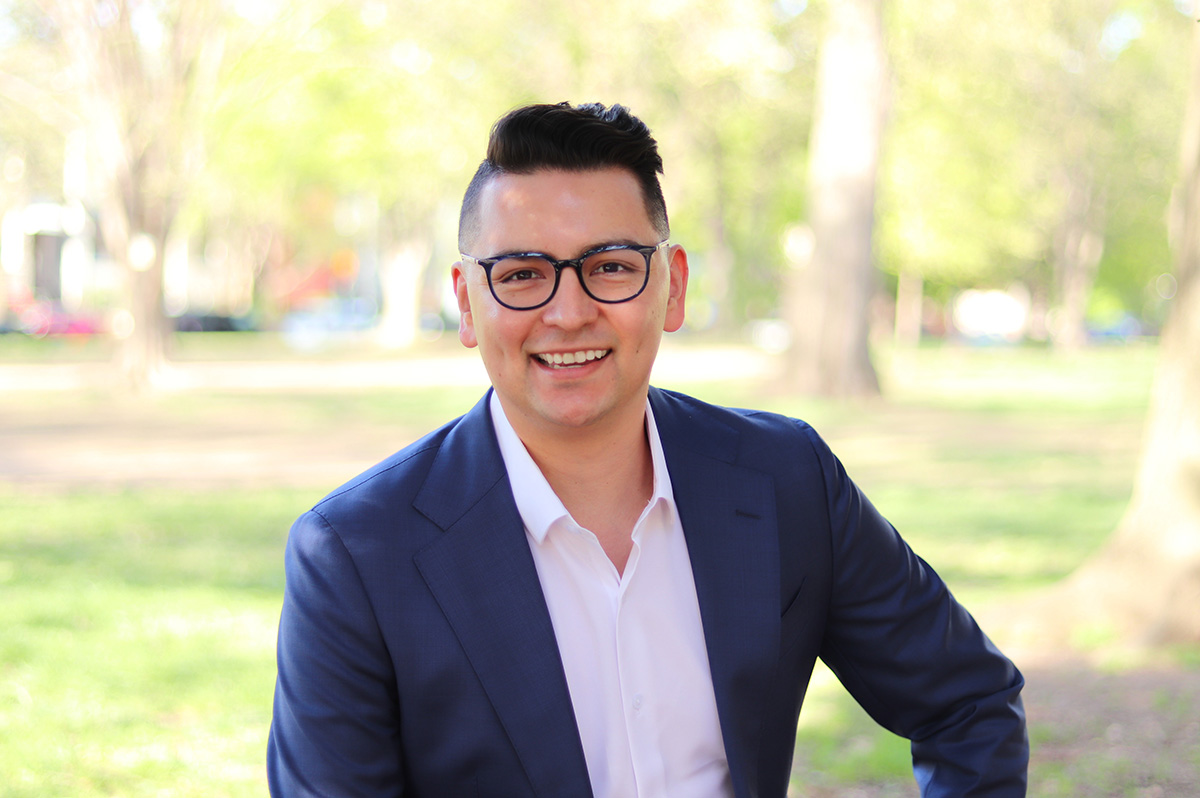
The Wanda Alston Foundation, the D.C.-based organization that has provided housing and support services for homeless LGBTQ youth since its founding in 2008, announced it has appointed longtime LGBTQ rights advocate Cesar Toledo as its new executive director.
In an April 22 statement, the organization said that as part of a planned leadership transition launched in November 2024, Toledo will succeed June Crenshaw, who Alston Foundation officials and LGBTQ community activists say has led the organization with distinction in her role as executive director for the past nine years.
In a statement released last November, the foundation announced Crenshaw was stepping down from her role as executive director after deciding to “to step into her next chapter.”
“June’s leadership has been truly transformative,” said Alston Foundation Board Chair Darrin Glymph in the group’s April 22 statement. “We are immensely grateful for her dedication and equally excited for the energy and experience that Cesar brings to lead us into this next chapter,” Glymph said.
“A seasoned LGBTQ+ advocate, Cesar brings over a decade of experience leading national campaigns, shaping public policy, and building inclusive communities,” the statement released by the group says. “Most recently, he served as the National LGBTQ+ Engagement Director for the Harris for President Campaign and has built a career focused on advancing equality and equitable education,” it says.
Biographical information about Toledo shows that immediately prior to working for the Harris For President Campaign, he served since April 2023 as deputy director for Democrats for Education Reform DC (DFER DC), a political group that helps to elect candidates for public office committed to quality education for all students, including minorities, people of color and LGBTQ youth.
Before joining DFER DC, Toledo served as political director for the LGBTQ+ Victory Fund, where he assisted in electing out LGBTQ candidates to all levels of public office across the U.S.
“I’m really excited about joining the Wanda Alston Foundation,” Toledo told the Washington Blade. “After a decade of working at the intersection of politics and policy and advancing political candidates and equitable education here in D.C., I wanted to shift my career to direct services to the most vulnerable folks in the LGBTQ+ family and our homeless youth,” he said.
Among other things, he said he would push for increasing the Alston Foundation’s visibility and mainlining its services for LGBTQ youth at a time when the national political climate has become less supportive.
A statement on its website says the Alston Foundation was founded in 2008 “in memory of Wanda Alston, a fierce LGBTQ+ activist, national advocate, and government official who was admired by District residents.”
The statement adds, “The foundation opened the first housing program in the nation’s capital in 2008 providing pre-independent transitional living and life-saving support services to LGBTQ+ youth.”
In a separate statement, the Alston Foundation announced it would hold a “thank you” celebration of appreciation for June Crenshaw from 6-8 p.m. on May 20 at Crush Dance Bar located at 2007 14th Street, N.W. in D.C.
“Let’s come together to celebrate her dedication and commitment for everything she has done for the LGBTQIA homeless youth population,” the statement says.
Virginia
Gay talk show host wins GOP nom for Va. lieutenant guv
John Reid becomes first out gay nominee for statewide office in state
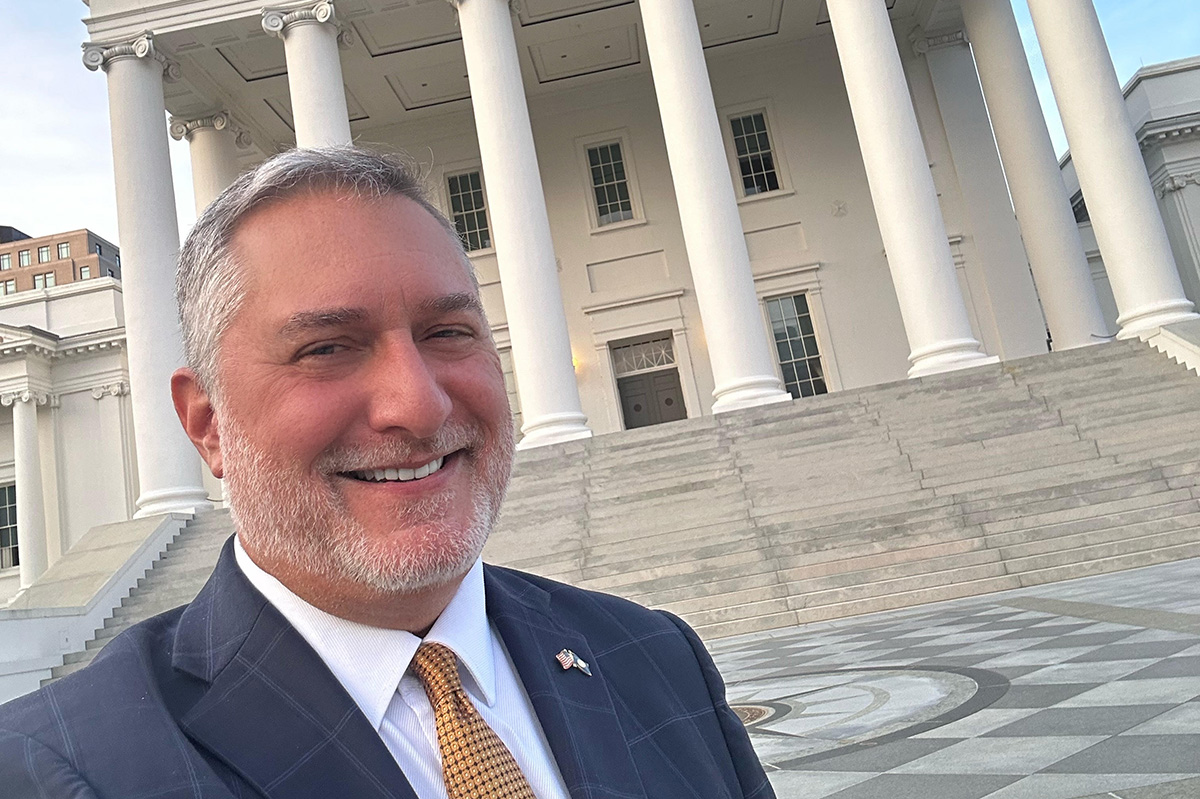
John Reid, a conservative gay radio talk show host in Richmond for many years, this week secured the Republican nomination for the office of lieutenant governor in Virginia, becoming the first known openly gay person to be nominated for a statewide office in that state.
Reid secured the nomination after his only rival in the Republican primary, Fairfax County Supervisor Pat Herrity, dropped out of the race this week for health reasons.
Herrity’s decision to withdraw from the race finalized the GOP nominees for Virginia’s three statewide contests in the November general election in what political observers are calling an unusually diverse GOP slate.
Current Virginia Lt. Gov. Winsome Earle-Sears, a Black woman, captured the GOP nomination for governor without a GOP opponent. Jason S. Miyares, a Hispanic man, is running for re-election as Virginia attorney general without a GOP rival. And Reid, a gay man, is the GOP nominee for lieutenant governor.
Reid will face one of six Democratic candidates for lieutenant governor who are competing in the June 17 Democratic primary.
The Blade spoke with Reid on Tuesday. Below is a partial transcript of that interview.
Blade: Is there a message you have for LGBTQ voters in Virginia, including Democrats, for why you think they should vote for you?
Reid: Well, the thing that I would say to gay voters who are looking and examining the candidates, is that I was out of the closet as a gay Republican publicly in very difficult rooms where people weren’t accepting of gay men – long before Donald Trump said I don’t care about this stuff.
And long before polite society said this was OK. So, in the ‘90s I came out on television and said on Oct. 11 – it was on National Coming Out Day. It was probably in 1996 or 1997. I started at the TV station in 1994. So, it was a couple of years into it.
I came out and said you never know your news anchor could be gay on National Coming Out Day. And everyone was appalled. How can you say this? You’re not supposed to say something like that. So even though I’m a Republican I know some people in the LGBT community are reflexively hostile to Republicans.
I took that step in public, and I think I helped change a lot of minds within the Republican Party and within central Virginia, which continues to be a pretty conservative place by being true to who I am. I spoke out in meetings around Republican staff and legislators and said I think we are not doing the right thing by being hostile to gay marriage.
We talk about the importance of family – Republicans talk about the importance of family, the importance of marriage as a fundamental building block of society. And a gay marriage is a net positive. Is it biblical to people who are following traditional Christian theology? No. But is it good for our society to have people in committed relationships? I think yes.
When we were going through the debate over gays in the military I said I see no reason that someone who is qualified to be in the military and can meet every single standard that everyone else is asked to meet, why should they not be in the Naval Academy, the Air Force Academy, West Point? Or serving as a grunt in active duty. Why would we exclude those people?
And those were very unpopular positions within the Republican Party.
Blade: Your campaign website says you have supported civil unions for same-sex couples. I could have missed seeing it, but I didn’t see an expression of support for gay marriage. Are you saying now that you support full same-sex marriage?
Reid: You know, you’re right. There is a distinction. And I think marriage is completely legitimate. Civil unions – if you want to go and sign paperwork at the courthouse – that’s great. If you want to be married and if a church wants to marry you if you find a church and religious leader and group that wants to bless that – that’s what I hope to do with my partner now.
Sometime in the near future I hope we will be married. And it’s very important to me as a Christian to be married in a church. So, that’s interesting. Most people would not draw that distinction. I appreciate that you’re drawing a distinction. I’m supportive of both.
Blade: Did you say you worked for a member of Congress? Can you say who that was?
Reid: George Allen, the senator from Virginia. And, of course, you and I – I know you’ve covered so many stories like this that you’ve brought together. But it was a very difficult position. When I started with Sen. Allen, he had a very libertarian attitude about this. The [Virginia State] constitutional amendment was not necessary. There was no need to go down that road.
And of course President Bush – George W. – was very assertive during the 2004 campaign. And then the issue continued to bubble up and you know we wound up with this amendment in the Virginia Constitution that banned gay marriage until the Supreme Court decision. And I was not supportive of that. And I voted for my boss, my senator, who I respected and still do respect.
Blade: Your website shows that your support for the gay community does not extend to the transgender community.
Reid: Yeah, I hate this. But I do think that our current focus on trans issues is where the gay rights movement has jumped the shark. And I think we’re losing support that we worked very diligently for decades to build with the average person. And I’m puzzled that the former leaders of the Human Rights Campaign had presidents when Elizabeth Birch and others – I don’t know what their stance is today.
I do recall that all of us who talked about gay rights issues focused on normalcy and that we would meet every standard that everyone else met. That all the vile things that were said about gays being pedophiles and grooming children – that simply was not true.
And I think we have stumbled into a very unfortunate and dangerous territory where we’re almost taunting the average person with an insistence that they accept drag queen story hour and the provocative books and provocative media that the average person would say, ‘You told us you were normal. – quote unquote normal – and now you are peddling an agenda which we don’t agree with and you’re being really aggressive about it.
And that’s really a difference. I know you’ve been covering it for a long time. I don’t know if you agree with this. I think we are peddling a very different political agenda today than the gay community was 20 years ago. And I think we should restrain ourselves and be cautious about that. And I think we’re in dangerous territory with the general population. And I’d urge caution about that.
Blade: Online reports show that there are as many as six Democratic candidates competing for the lieutenant governor’s position in the June 17 Democratic primary. Do you know any of them?
Reid: I’m familiar with most of them. Some are from the Richmond area. And I believe they are all very supportive of gay rights, which is I think a good thing. My reason for challenging them as a Republican – and I think there are other places where there is a lack of appropriate leadership and good judgment. And so, I don’t expect the gay issue would be a real issue. The trans issue may be a point of contention in the race.
But I don’t think the gay issue – and I do draw a distinction between the two — I don’t think that will be a real dividing line with those Democrat[ic] candidates.
Blade: So unlike when you were a TV news anchor, on your radio talk show were you able to offer more opinions and commentary?
Reid: That’s correct. There was a lot of opining, no script. So, I was able to tell stories about how I traveled to Miami, and I went to Washington. I went to the Kennedy Center and shared some of my life and lifestyle as appropriate with the audience.
Blade: Well, thank you for this interview.
Reid: I’m happy to talk to you. One of the reasons I called you back is that the political consultants have always told me don’t talk to anybody that might disagree with you. And I reject that. I have already lived 30 years as an out gay man. And it has been very difficult. And I would like to make it easier for the next generation to live their authentic selves. … Calling you and talking to you against the advice of all these people who say never do that, I’m hopeful that my willingness to engage and be candid will ultimately be well received, I hope.

